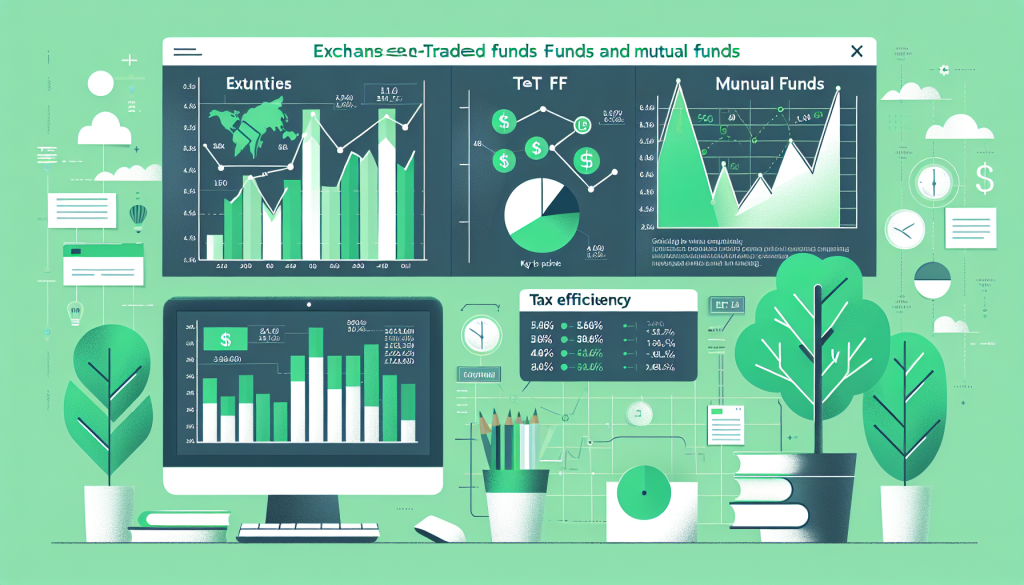The world of investing is filled with myriad options, each with its own advantages and disadvantages. Exchange-Traded Funds (ETFs) and Mutual Funds are among the most popular investment vehicles. While both offer investors the opportunity to diversify their portfolios, they differ significantly in their structure, cost, and tax implications. This article will delve into the reasons why ETFs are often a more tax-efficient choice than mutual funds, beyond the commonly cited lower expense ratios.
Understanding ETFs and mutual funds
Before we delve into the tax implications, it’s essential to understand what ETFs and mutual funds are. Both investment funds pool money from numerous investors to invest in a diversified portfolio of assets such as stocks, bonds, or other securities.
Mutual funds are typically managed by a professional fund manager who makes investment decisions on behalf of the fund’s shareholders. They are priced once a day at the close of the trading day based on their net asset value (NAV).
On the other hand, ETFs are traded on an exchange like individual stocks, meaning their prices fluctuate throughout the trading day based on supply and demand. ETFs can be passively managed, tracking a specific index, or actively managed, where a manager or team makes investment decisions.
The cost factor
The cost is one of the most cited reasons for choosing ETFs over mutual funds. ETFs typically have lower expense ratios than mutual funds, making them a more cost-effective choice for many investors. However, the cost is just one piece of the puzzle. The tax implications of these investment vehicles can significantly impact your overall returns, which brings us to the crux of our discussion.
The tax advantage of ETFs
To understand the tax advantage of ETFs, let’s consider a simple hypothetical scenario. Suppose you own four stocks in a mutual fund, and one of them, says Nvidia, experiences a significant increase in value. The mutual fund manager decides to sell some of the Nvidia shares to manage risk and maintain the fund’s asset allocation. This sale triggers a capital gains tax event for the mutual fund shareholders, even if they did not sell their shares in the fund.
In contrast, the same process in an ETF does not generally create a taxable event. This is because ETFs use a mechanism called “in-kind” transactions to avoid triggering capital gains. When an ETF needs to rebalance its portfolio, it can swap securities with another institutional investor rather than sell them. This process does not trigger a capital gains tax event, making ETFs more tax-efficient.
The impact on returns
The tax efficiency of ETFs can significantly impact your investment returns. According to data, over 50% of mutual funds create taxable events yearly, compared to a much smaller fraction of ETFs. The average mutual fund loses 1.5% of its returns to taxes each year.
Consider a $1 million portfolio invested for 20 years to put this into perspective. The tax inefficiency of mutual funds could cost you as much as $1.9 million in taxes over this period, a substantial amount that could significantly erode your investment returns.
Conclusion
While the lower expense ratios of ETFs are often highlighted, their tax efficiency is an equally, if not more, important factor to consider when choosing between ETFs and mutual funds. If you or your financial advisor are buying mutual funds in a taxable account, it may be worth considering switching to ETFs to save on taxes and enhance your overall returns.
However, it’s important to note that every investor’s situation is unique, and what works for one may not work for another. Therefore, it’s crucial to consider your individual investment goals, risk tolerance, and tax situation before making any investment decisions. Always consult with a financial advisor or tax professional to ensure you’re making the best decisions for your financial future.
Frequently Asked Questions
Q. What are ETFs and mutual funds?
ETFs and mutual funds are types of investment funds that pool money from numerous investors to invest in a diversified portfolio of assets such as stocks, bonds, or other securities. Mutual funds are typically managed by a professional fund manager and priced once a day at the trading day’s close based on their net asset value (NAV). On the other hand, ETFs are traded on an exchange like individual stocks, meaning their prices fluctuate throughout the trading day based on supply and demand.
Q. Why are ETFs often a more cost-effective choice than mutual funds?
ETFs typically have lower expense ratios than mutual funds, making them a more cost-effective choice for many investors. However, the cost is just one piece of the puzzle. The tax implications of these investment vehicles can significantly impact your overall returns.
Q. How do ETFs offer a tax advantage?
ETFs use “in-kind” transactions to avoid triggering capital gains. When an ETF needs to rebalance its portfolio, it can swap securities with another institutional investor rather than sell them. This process does not trigger a capital gains tax event, making ETFs more tax-efficient.
Q. What is the impact of tax efficiency on returns?
The tax efficiency of ETFs can significantly impact your investment returns. Over 50% of mutual funds create taxable events each year, compared to a much smaller fraction of ETFs. The average mutual fund loses 1.5% of its returns to taxes each year. This could cost you as much as $1.9 million in taxes over a 20-year period for a $1 million portfolio.
Q. Should I switch from mutual funds to ETFs?
While the lower expense ratios and tax efficiency of ETFs are often highlighted, it’s important to note that every investor’s situation is unique. Therefore, it’s crucial to consider your individual investment goals, risk tolerance, and tax situation before making any investment decisions. Always consult with a financial advisor or tax professional to ensure you’re making the best decisions for your financial future.
The post Tax efficiency: comparing ETFs and mutual funds appeared first on Due.
